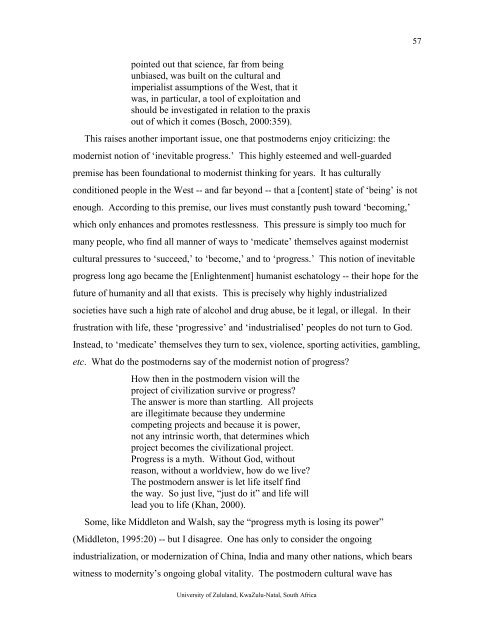Haase_UZ_x007E_DTh (2).pdf - South African Theological Seminary
Haase_UZ_x007E_DTh (2).pdf - South African Theological Seminary
Haase_UZ_x007E_DTh (2).pdf - South African Theological Seminary
You also want an ePaper? Increase the reach of your titles
YUMPU automatically turns print PDFs into web optimized ePapers that Google loves.
pointed out that science, far from being<br />
unbiased, was built on the cultural and<br />
imperialist assumptions of the West, that it<br />
was, in particular, a tool of exploitation and<br />
should be investigated in relation to the praxis<br />
out of which it comes (Bosch, 2000:359).<br />
This raises another important issue, one that postmoderns enjoy criticizing: the<br />
modernist notion of ‘inevitable progress.’ This highly esteemed and well-guarded<br />
premise has been foundational to modernist thinking for years. It has culturally<br />
conditioned people in the West -- and far beyond -- that a [content] state of ‘being’ is not<br />
enough. According to this premise, our lives must constantly push toward ‘becoming,’<br />
which only enhances and promotes restlessness. This pressure is simply too much for<br />
many people, who find all manner of ways to ‘medicate’ themselves against modernist<br />
cultural pressures to ‘succeed,’ to ‘become,’ and to ‘progress.’ This notion of inevitable<br />
progress long ago became the [Enlightenment] humanist eschatology -- their hope for the<br />
future of humanity and all that exists. This is precisely why highly industrialized<br />
societies have such a high rate of alcohol and drug abuse, be it legal, or illegal. In their<br />
frustration with life, these ‘progressive’ and ‘industrialised’ peoples do not turn to God.<br />
Instead, to ‘medicate’ themselves they turn to sex, violence, sporting activities, gambling,<br />
etc. What do the postmoderns say of the modernist notion of progress<br />
How then in the postmodern vision will the<br />
project of civilization survive or progress<br />
The answer is more than startling. All projects<br />
are illegitimate because they undermine<br />
competing projects and because it is power,<br />
not any intrinsic worth, that determines which<br />
project becomes the civilizational project.<br />
Progress is a myth. Without God, without<br />
reason, without a worldview, how do we live<br />
The postmodern answer is let life itself find<br />
the way. So just live, “just do it” and life will<br />
lead you to life (Khan, 2000).<br />
Some, like Middleton and Walsh, say the “progress myth is losing its power”<br />
(Middleton, 1995:20) -- but I disagree. One has only to consider the ongoing<br />
industrialization, or modernization of China, India and many other nations, which bears<br />
witness to modernity’s ongoing global vitality. The postmodern cultural wave has<br />
57<br />
University of Zululand, KwaZulu-Natal, <strong>South</strong> Africa

















